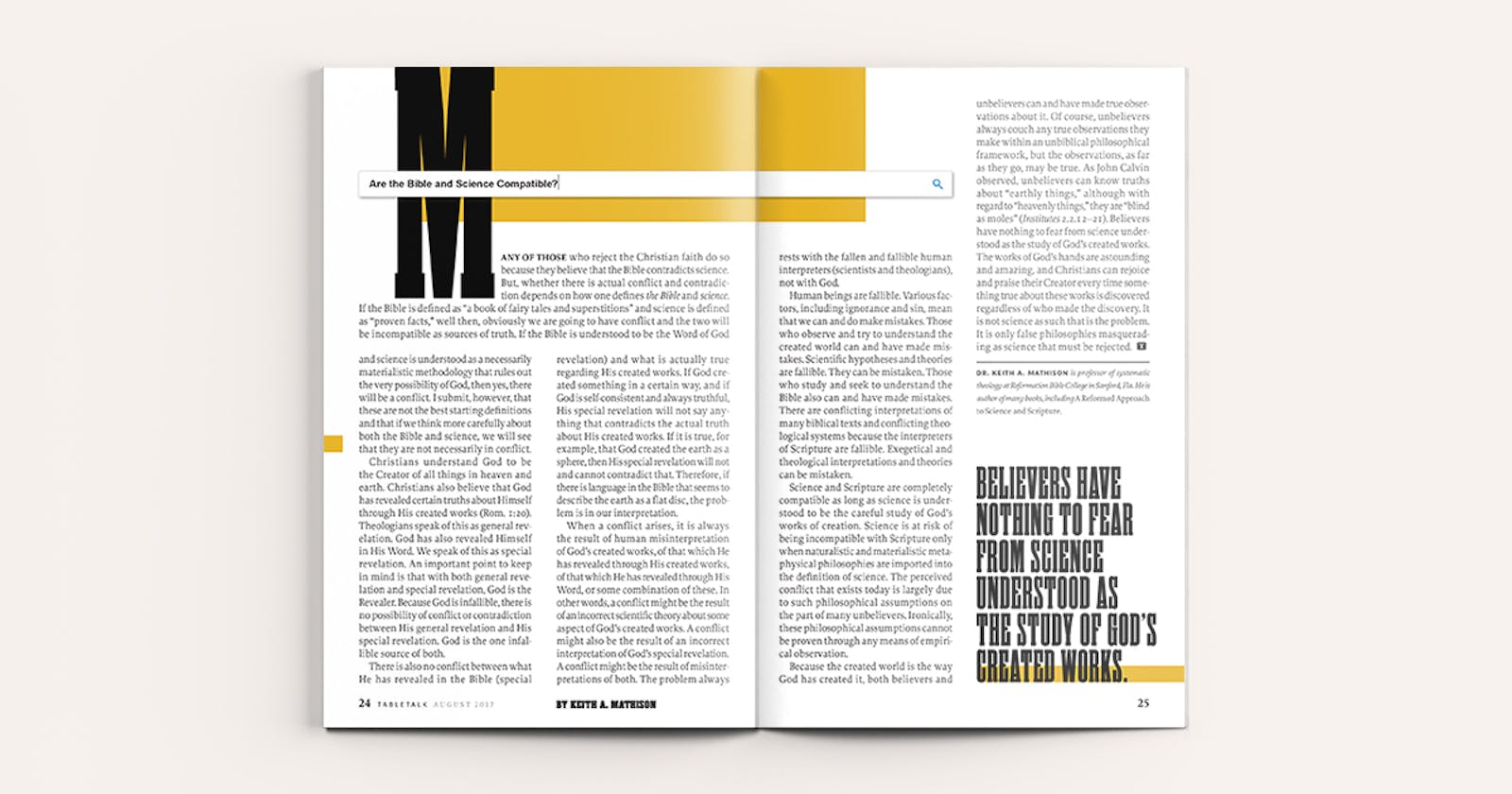
Request your free, three-month trial to Tabletalk magazine. You’ll receive the print issue monthly and gain immediate digital access to decades of archives. This trial is risk-free. No credit card required.
Try Tabletalk NowAlready receive Tabletalk magazine every month?
Verify your email address to gain unlimited access.
Many of those who reject the Christian faith do so because they believe that the Bible contradicts science. But, whether there is actual conflict and contradiction depends on how one defines the Bible and science. If the Bible is defined as “a book of fairy tales and superstitions” and science is defined as “proven facts,” well then, obviously we are going to have conflict and the two will be incompatible as sources of truth. If the Bible is understood to be the Word of God and science is understood as a necessarily materialistic methodology that rules out the very possibility of God, then yes, there will be a conflict. I submit, however, that these are not the best starting definitions and that if we think more carefully about both the Bible and science, we will see that they are not necessarily in conflict.
Christians understand God to be the Creator of all things in heaven and earth. Christians also believe that God has revealed certain truths about Himself through His created works (Rom. 1:20). Theologians speak of this as general revelation. God has also revealed Himself in His Word. We speak of this as special revelation. An important point to keep in mind is that with both general revelation and special revelation, God is the Revealer. Because God is infallible, there is no possibility of conflict or contradiction between His general revelation and His special revelation. God is the one infallible source of both.
There is also no conflict between what He has revealed in the Bible (special revelation) and what is actually true regarding His created works. If God created something in a certain way, and if God is self-consistent and always truthful, His special revelation will not say anything that contradicts the actual truth about His created works. If it is true, for example, that God created the earth as a sphere, then His special revelation will not and cannot contradict that. Therefore, if there is language in the Bible that seems to describe the earth as a flat disc, the problem is in our interpretation.
When a conflict arises, it is always the result of human misinterpretation of God’s created works, of that which He has revealed through His created works, of that which He has revealed through His Word, or some combination of these. In other words, a conflict might be the result of an incorrect scientific theory about some aspect of God’s created works. A conflict might also be the result of an incorrect interpretation of God’s special revelation. A conflict might be the result of misinterpretations of both. The problem always rests with the fallen and fallible human interpreters (scientists and theologians), not with God.
Human beings are fallible. Various factors, including ignorance and sin, mean that we can and do make mistakes. Those who observe and try to understand the created world can and have made mistakes. Scientific hypotheses and theories are fallible. They can be mistaken. Those who study and seek to understand the Bible also can and have made mistakes. There are conflicting interpretations of many biblical texts and conflicting theological systems because the interpreters of Scripture are fallible. Exegetical and theological interpretations and theories can be mistaken.

Science and Scripture are completely compatible as long as science is understood to be the careful study of God’s works of creation. Science is at risk of being incompatible with Scripture only when naturalistic and materialistic metaphysical philosophies are imported into the definition of science. The perceived conflict that exists today is largely due to such philosophical assumptions on the part of many unbelievers. Ironically, these philosophical assumptions cannot be proven through any means of empirical observation.
Because the created world is the way God has created it, both believers and unbelievers can and have made true observations about it. Of course, unbelievers always couch any true observations they make within an unbiblical philosophical framework, but the observations, as far as they go, may be true. As John Calvin observed, unbelievers can know truths about “earthly things,” although with regard to “heavenly things,” they are “blind as moles” (Institutes 2.2.12–21). Believers have nothing to fear from science understood as the study of God’s created works. The works of God’s hands are astounding and amazing, and Christians can rejoice and praise their Creator every time something true about these works is discovered regardless of who made the discovery. It is not science as such that is the problem. It is only false philosophies masquerading as science that must be rejected.
